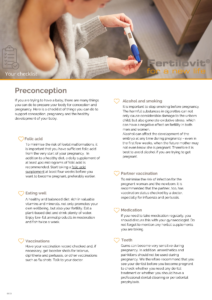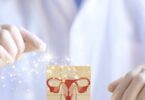During preconception, there is a lot you can do to support healthy conception and fertility and even the health of your future child.
It All Adds Up
Your oocytes are in your body since you were born and they have celebrated each and every birthday with you. They have also participated in everything that happened to your body, unfortunately also including all those little “sins” (smoking, alcohol, coffee). The good as well as the bad, it all adds up and influences oocyte quality.
Therefore it is important to make healthy choices well before pregnancy. Stop smoking and drug usage and reduce coffee and alcohol consumption, because it may diminish your chances of conceiving. Please try and avoid extremely distressing situations when possible. Sleeping sufficiently, exercising regularly and maintaining a healthy BMI will have a positive effect on your fertility. Nutrition has a major impact on fertility, too.
Have your dental health checked, as well as your own and your partner’s vaccination status. This way you can be sure that no dangerous infections can endanger the pregnancy. Your doctor can also check all the medications you use (including herbal ones) to see if they are suitable for you if you want to have children and, if necessary, suggest alternatives.
A great checklist with all the important points that you can consider if you want to have children can be easily downloaded here.
Fertility and Diet
Recent research has shown that there is a range of dietary choices that are beneficial for your fertility:
– avoid trans fats, which are found in any product containing hydrogenated vegetable oil, such as many solid margarines, most commercial baked goods and most fast foods
– instead eat more unsaturated fats, contained for example in premium vegetable oils, olive and canola oils, nuts and fatty fish such as tuna, salmon or herring
– eat more vegetable protein (think legumes and nuts) and less animal protein
– when it comes to carbohydrates, choose products with a low glycaemic index (whole grain products) rather than white rice, potatoes or white breads
– consume one to two servings of a full fat dairy product each day. Recent findings of the American Nurses’ Health Study suggest very strongly that this has a beneficial effect on fertility
– make sure you get enough iron (good sources include fruit, vegetables, beans, red meat is not recommendable)
– be aware of what you drink: water is ideal, coffee, tea and alcohol in moderate quantities won’t do any harm, but try to avoid sodas
Important Vitamins
It has long been known that folic acid plays a crucial role for a baby’s healthy development. Lack of folic acid has been associated with deformities such as spina bifida (split spine) and others. In addition to this there is a wide range of other vitamins and micronutrients that have been shown to contribute to conception and a healthy pregnancy.
Fertility supplements
Other vitamins have a positive effect on fertility and pregnancy as well. If you sometimes find it difficult to ensure that you eat a healthy and varied diet in everyday life, it may make sense to take a suitable fertility vitamins. However, individual nutritional requirements should be taken into account, as they can occur particularly with previous illnesses such as Hashimoto’s, endometriosis or PCOS.









Thank you for the article.
Great blog that I enjoyed reading.